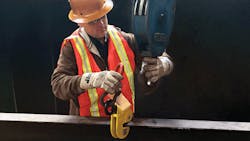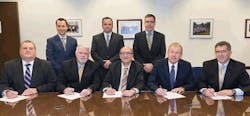Raising Safety: OSHA and Crane, Hoist, Monorail Partners Renew Alliance
In the United States, it takes a year with a learner's permit before you are even eligible to drive a car without supervision. There are all kinds of training materials available for new drivers to ensure they operate vehicles in a safe manner.
However, in the overhead lifting industry, there is not enough content available to help companies properly train their workers. The renewal of the alliance between OSHA and the Crane, Hoist, Monorail (CHM) partners will ensure that void is filled.
"This alliance is a fantastic example of hard work starting to pay off," says Josh Arwood, president of Ace Industries, one of the member companies. Arwood expanded the automative analogy even further.
"OSHA specifications for cranes, hoists and monorails have essentially remained unchanged for about 50 years," he says. "Could you imagine if safety standards for motorized vehicles did not include information about current technology such as hands-free phones or GPS systems? Now imagine that the safety standards also do not include information about power locks and windows or power steering. Lastly, imagine they only cover standard combustion engine cars, not even mentioning motorcycles, trucks, buses or electric cars.
"Hard to imagine, but that is how narrow the OSHA specifications were for overhead cranes, hoists and monorails. The fact that OSHA wants input from the CHM Alliance is a testament to the hard work of all the participants over the past decade. Also, I believe it is an indication that OSHA sees the alliance as their trusted advisor as they work to champion worker safety."
These crane, hoist and monorail partners are the overhead lifting product groups of trade association Material Handling Industry (MHI), namely Crane Manufacturers Association of America (CMAA), Hoist Manufacturers Institute (HMI) and Monorail Manufacturers Association (MMA).
Through its alliance program, OSHA works with unions, consulates, trade and professional organizations, faith- and community-based organizations, businesses and educational institutions to prevent workplace fatalities, injuries and illnesses. It is particularly keen to reduce worker exposures to electrical shock, electrocution, falls from elevation and being struck-by moving equipment, through the latest alliance renewal.
"Our alliance with CHM has been invaluable in helping to reduce and prevent serious or fatal incidents in the material handling industry," said Assistant Secretary of Labor for Occupational Safety and Health Dr. David Michaels. "We will continue to focus on efforts and resources that implement best industry practices that help keep crane, hoist and monorail operators safe and healthy."
Matthew Smurr, managing executive of the overhead groups and senior director, solution and product groups, at MHI, called the alliance "a direct and valuable connection to the U.S. regulatory agency for workplace safety," noting it "is beneficial to both sides."
The original CHM Alliance was signed in October 2005 with subsequent renewals following. This is the sole alliance any MHI product group has with OSHA, and, due to budgetary considerations, OSHA has recently focused on keeping only those alliances with demonstrable value. It is significant that OSHA has extended the renewal term to five years after a decade of successful collaboration.
Renewal of the alliance is far from a formality. Smurr explains that OSHA has a process and a number of program development exercises that have to be completed, following which a multi-level review is conducted.
"We have added value to our members through the generation of OSHA-related products, such as safety guides and tip sheets, relevant to the products they produce, while the sharing of information and promotion of best practice methods has enhanced safety in the workplace," says Smurr, adding it all aligns with OSHA's end goals.
Validation of Efforts
Chris Becker, president of CMAA as well as member company G.W. Becker Inc., says that the renewal of the alliance is a "huge validation of the CMAA's commitment to provide a safe product."
"Our members manufacture the safest overhead lifting equipment available to end users, supported by the best possible information and literature, but the OSHA alliance adds significant validity to that message," he adds.
According to Becker, the alliance adds great mileage to their product-related safety messages. "We track the number of content downloads from the OSHA Alliance web site and not only are they impressive in number, we are confident that this information is being sought – and found – by end users of overhead lifting equipment, which are target recipients."
Arwood notes that the alliance represents an avenue for CMAA, HMI and MMA members to provide industry-specific guidance related to OSHA to reach the goal of improving worker safety when using overhead lifting equipment. "As many workers use overhead cranes and hoists without proper training, the alliance provides targeted training material for business owners, managers and operators that is approved by OSHA," he adds.
Arwood, who joined Becker, Smurr and others at the latest signing ceremony, says that although the alliance is specific to the overhead lifting industry, it provides a roadmap to other [MHI] industry groups who are interested in partnering with OSHA to raise awareness of best practices for safe operation of their equipment.
Smurr adds that in coming years, the alliance will focus more on industry outreach and education opportunities. "We even hope to have [OSHA] as a presenter for the CHM groups at a future meeting," he says.
Driving Change
Arwood notes that a commitment to positive change in the long-term has been prevalent from the outset.
"All new endeavors take time to find their footing," he says. "In this case, with three industry groups [CMAA, HMI, MMA] approaching the alliance in somewhat different ways, overall progress was hard to see. Even with those headwinds, the CHM Alliance developed over 30 safety documents related to the crane and hoist industry."
In a recent development, the CHM Alliance has begun to package sets of these documents to answer three questions:
- As a business owner, executive or upper-level manager, why is this topic important to me?
- As a safety manager or person conducting training at my facility, how can I effectively teach this concept to people who use the equipment?
- As a worker who uses the equipment, what are the key things I need to remember from this training?
"Ultimately," Arwood says, "The sets can be used in toolbox-type safety meetings. Safety professionals are always looking for content to use when training workers at their facilities. Who better to provide training for overhead cranes, hoists and monorails than the leading manufacturers in the country?"
In the coming years, users of overhead lifting equipment will see training materials designed to teach them about the products they use every day, says Arwood.
Becker also sees CMAA providing an increasingly advisory role: "During our conversations with Dr. Michaels at OSHA following the signing ceremony, we were given a very clear indication of the strength of our partnership and the opportunities moving forward. I was particularly encouraged by the prospect of participating in activity at the OSHA Training Institute where field inspectors develop their knowledge and understanding. To have such an important role to play in the safety of industry moving forward is tremendously invigorating."
OSHA originally established an Alliance Program in March 2002 to enable organizations committed to safety and health to work with OSHA to prevent injuries, illnesses and fatalities in the workplace. The purpose of each alliance is to develop compliance assistance tools and resources, and to educate workers and employers about their rights and responsibilities. Alliance Program participants do not receive exemptions from OSHA inspections or any other enforcement benefits.
Richard Howes is a director at public relations and communications company, Bridger Howes Ltd., which serves a number of clients in the industrial and construction sectors. He formerly was an editor of trade magazines, with 10 years of experience in the business-to-business sector. He covered the original signing of the Crane, Hoist and Monorail OSHA Alliance in 2005 for an industrial lifting equipment publication and has followed the partnership closely since.

